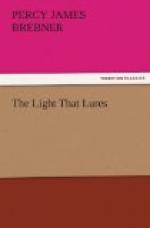“I understand.”
“And you forgive the seeming discourtesy?”
“There is nothing to forgive. The idea crossed my mind on the way here, and I was cautious.”
“Close to the Place du Carrousal,” said Bruslart, “in a side street, there is a wine shop, an iron sign representing three barrels hangs over the door; if you could pass there every afternoon at four, I could find you when I was ready for your help.”
Barrington promised to make a habit of passing this place at four in the afternoon and took his leave. He had hoped that Bruslart would have accomplished more, but it was something that he had done so much. It was absurd to feel any disappointment, in so short a time what more could he have done? Yet Barrington walked rapidly and in the direction of the Rue Valette. Bruslart had said nothing to alter his determination to see Raymond Latour.
He saw nothing of Seth in the street, and hardly expected to find Latour at home, but no sooner had he knocked than the door was opened and Latour welcomed him. He locked the door again when Barrington had entered.
“I am fond of study,” he said, pointing to some open books on the table.
“And I disturb you?”
“No. I think I have almost been expecting you.”
Barrington did not answer. It was necessary that he should get the measure of this man, understand the working of his mind, see the thoughts which were concealed behind his words. Barrington was as alert as though rapiers were in their hands, and only the death of one of them could satisfy the quarrel.
“Is it necessary for me to tell you that I guessed who you were yesterday?” said Latour.
“No, I knew that.”
“It was not until I returned here that I knew who was in that coach. That is why I have been expecting you.”
Barrington sat down, and with his elbows on the table supported his chin in his hands. In this position he looked fixedly at his companion, and neither of them spoke for a few moments. Then Latour sat down on the opposite side of the table.
“I see how it is, Monsieur Barrington, you do not believe me. I am not surprised. I am sufficiently well known in Paris for you to have discovered, if you have taken the slightest trouble to inquire, that I am a red republican, anathema to those who desire milder methods, a bloodhound where aristocrats are concerned. Still, I did not know who was in that coach any more than you did.”
“If you had known?” asked Barrington.
“I should still have put out my hand to preserve your life.”
“Are you quite sure of that?”
“Quite sure.”
“You would not have rushed with me into that crowd, thinking of nothing but the woman in the coach.”
“What should make you think so?”
“You forget perhaps that you told me there was a woman, an aristocrat, for whom you would do much,” said Barrington.




